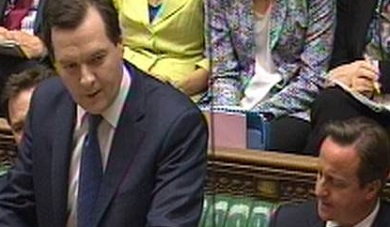In the aftermath of Chancellor George Osborne’s stringent Government Spending Review, even a major charity like Citizens Advice had some kind words for how Downing Street plans to use those £740 billion from taxpayer pockets between April 2015 and April 2016.
“Reducing universal benefits for over-65s, such as winter fuel payments, may be uncomfortable but is right,” said Thursday Gillian Guy, CEO of one of the largest networks of local bureaux helping financially vulnerable families. “When people, especially low paid families and those struggling to find work, are feeling the squeeze in these tough economic times, this is a discussion that can’t be side-stepped. Britain needs a sustainable welfare budget.”
Osborne’s gable may be already paying off. What the Chancellor did on Wednesday was to introduce a further-austerity programme with £11.5 billion in budget cuts at a moment when public opinion in the UK is justifiably scared by the reflections coming from the Eurozone mirror. Timing is everything in politics: “Politics is the ability to foretell what is going to happen tomorrow, next week, next month and next year,” Winston Churchill wrote. Or what won’t happen. The Coalition cabinet has dispatched the bad news almost two years ahead of the general elections; what will remain by then of this week’s announcement in the memory of UK voters?
Still, today the new round of fresh cuts had to meet harsh criticism, although not from the usual quarters.
To be sure, the Trades Union Congress delivered its hammer hit, one not exactly uncalled for: “Worst of all is a new attack on some of the most vulnerable in our society through the seven day wait and other conditions for social security payments. The Chancellor may think attacks on welfare go down well with voters…” Changes in benefits, local government spending and the Ministry of Justice bring all the same risk attached, according to most pro-social welfare lobbies, which is the expansion of divides between the British with medium to high incomes and those in need.
Yet, the strongest rejection against the Review came from within the City, from Fidelity, the £162.8-billion investment fund manager. In a public note, director Trevor Greetham blamed the government’s fiscal policy for being excessively aggressive: “If the UK economy had grown as the authorities had expected back in 2010 there would be no need for the cuts announced Wednesday. Up front austerity has proved largely counter-productive with the consequent lack of growth hampering attempts to pay down debt.”
“In stark contrast,” Greetham pointed out, “relatively easy fiscal policy in the US is helping the economy to grow its way out of debt with the budget deficit already down from 10% of GDP at its peak to 4% for the current year. House prices are rising, banks are lending and the Federal Reserve is talking about raising interest rates one day.”
In his opinion, the US experience would have caused “a sea change” in attitudes around the world: “Even the euro area is giving the peripheral countries more time to make fiscal adjustments … Just as the rest of the world decides up front austerity is a bad idea, it seems the UK political establishment has agreed there is no alternative.”
There was no welcome either from the City intelligentsia. Pro-free market think tank Institute of Economic Affairs gave the Chancellor the cold shoulder. Editorial director Philip Booth did his own review on Osborne’s record, reminding the country that “George Osborne made a significant mistake by increasing taxation in the early years of the parliament and then being too timid when it came to spending cuts. The much discussed “cuts” are largely reductions in projected increases in spending. This was a missed opportunity to correct that error.”
Or the peculiar and subtle exercise of praising only the no-cuts side of the programme that the Confederation of the British Industry presented this morning: “Infrastructure is rightly singled out as the most effective engine for growth,” “…other pro-growth areas including science, innovation, skills and exports have also been shielded from cuts,” “…the £185 million boost for the Technology Strategy Board, a crucial anchor for innovation, is particularly welcome,” and so on.
With friends like these, no wonder prime minister David Cameron is letting his Chancellor to look after those whose company really matters: the vast majority of big state budget-averse working and middle class voters.






Be the first to comment on "From the City and beyond: why more austerity again, Chancellor?"